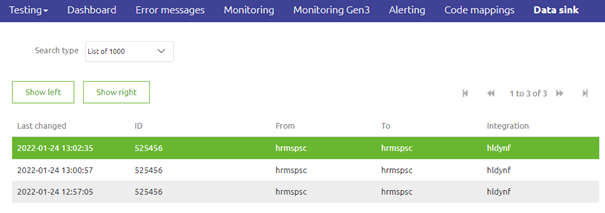Testing in eMagiz
In this fundamental we discuss different testing methods available in software development and discuss how these methods can be used and/or implanted within the platform. Testing in eMagiz can already be done within the Create phase and within deployed integrations via the Deploy and Manage phases. After reading this fundamental you should be able to understand the concepts of different testing methods and how these are incorporated within the eMagiz platform.
Should you have any questions, please get in touch with academy@emagiz.com.
1. Prerequisites
- Basic Knowledge of the eMagiz Platform
2. Key concepts
- Unit Testing
- Regression testing
- Performance Testing
- End-To-End Testing
3. Testing in eMagiz
This fundamental will zoom in on the testing functionality incorperated within the eMagiz portal. We will focus on different aspects of testing which can be executed at different moments within the development in your integrations. We cover four different types of testing which are part of software testing in general and explain them on a conceptual level. For each test we also discuss how those are integrated within the portal and where to find further explanation on applying those test within eMagiz.
3.1 Unit Testing
Unit testing is a common practice within software platforms. Usually, unit tests are performed by developers during development. It entails testing individual integrations or the components within an integration, such as transformations or mappings. The unit test aims to test early within the development process to identify and fix issues early before they become more difficult and costly to find and solve.
Within eMagiz, we have a dedicated unit testing functionality called "flow testing." One of the key benefits of flow testing is that your integration does not have to be deployed. Therefore, findings can be easily implemented during development. eMagiz supports certain components' live testing to test communication with external systems. More information on flow tests can be found in the following microlearnings:
- Crashcourse Platfrom
- Regression testing
3.2 Data Sink
On top of the standard Manage functionality in eMagiz, you can acquire additional functionality that allows you to sink data at any given point in the flow into a bucket hosted by eMagiz. We advise you to do this twice per integration. Once when the message enters the eMagiz platform and once the message leaves the eMagiz platform. By providing a unique identifier (i.e., an order number), you can search through this data for maximum 180 days (minimum 30 days) to determine whether a specific message with a particular identifier is indeed received and/or delivered by eMagiz in the Manage phase of eMagiz. See below for an illustration of this functionality.



For more information on data sink please check out the following Data sink
However, in some cases, there are additional legal requirements you need to meet. These legal requirements require you to prove for an extended period (i.e., seven years) that a specific message was sent at a particular moment in time. For this requirement, we have the long-term archiving functionality in eMagiz.
3.3 Long Term Archiving
The long-term archiving functionality is an expansion of the data sink functionality. By adding a specific tag to the logic within the flow, the data will be placed in the data sink and placed in our long-term archiving solution. In this solution, we will keep the data for a standard period of seven years before deleting the data from the long-term archiving solution. This allows you to retrieve chunks of data from the long-term archiving via a ticket request in our support portal. As a result, we will provide you with the requested data promptly.
For more information on data sink please check out the following Long term archiving
4. Key takeaways
- Each eMagiz model has a standard Manage phase in which statistics are kept on your environment
- With these statistics, you can determine whether messages have been received by and sent by eMagiz
- This functionality does not allow you to see the content of the messages itself
- On top of that, eMagiz offers Data Sink and long term Archiving as additional licensed features
- Data sink is helpful for an Ops scenario to check whether a specific message is processed by eMagiz (Traceability)
- Long term archiving is helpful for legal purposes as it gives you the option to prove for seven years that a specific message is sent at a specific time (Compliancy)
5. Suggested Additional Readings
If you are interested in this topic and want to learn how you can control your Cloud with the help of the eMagiz platform, please check out our microlearnings offering on eMagiz Cloud Management:
